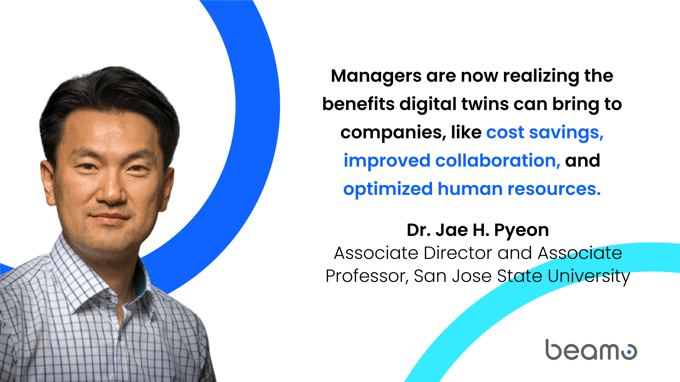Beamo interviews Dr. Pyeon, Associate Director and Associate Professor, San Jose State University. Read on as he shares his view on the role of digital twins in managing facilities during a pandemic, as well as other digital trends in the industry.
Q: How would you explain a digital twin to someone in facility management?
Prof Pyeon: A digital twin is how you can capture an exact 3D replica of your facility. Think of your physical facilities but digitally replicated in the cloud. Like Google Street View, but for buildings and sites. What’s more is that you can interact with your digital twin, store data, information, work records, etc., and collaborate with your teams onsite or offsite. It’s a strategic solution that I think can propel facility management closer to digitalization.
Q: In your experience, how do you see digital twins helping facility managers with their challenges?
Prof Pyeon: The biggest challenge of facility managers nowadays is managing human resources, especially during this pandemic. Complying with all the government regulations for workplaces (locally, nationally, and internationally), maintaining a healthy workforce, these added layers make it more difficult for planning and operations. With digital twins, you now have a tool that allows you to keep the workforce onsite at a minimum and, at the same time, allows your offsite or external teams access to your facility remotely when needed.
I’ve also seen companies use the digital twin as the single source of truth where they’ve integrated with their data management systems and IoT sensors. It gives facility managers a visual representation of what’s going on in their workplace and is such a useful tool for communication, collaboration, and even training. Instead of writing long reports and explaining in hundreds of pictures what’s happening in your facility, you can now SHOW people as if they are actually on site.
Q: Have you noticed a change in demand for digital twins in facility management during this pandemic?
Prof Pyeon: Absolutely. Now more than ever, it’s difficult to find experts and send them to remote locations, for site inspections and maintenance. You have their health at risk. You have to deal with quarantine restrictions across different locations. These only increase risks and costs. For the longest time, we could never imagine that there’d actually be a way to manage facilities and NOT have your teams be onsite. But now, managers are realizing that digitization for facility management is possible and is actually vital to adapt to current times and be competitive in the market. Your teams, one way or another, may still need to visit the site, but their visits can be significantly reduced, optimizing the amount of work they can do with just a few visits. Managers are now realizing the benefits digital twins can bring to companies, like cost savings, improved collaboration, and optimized human resources.

Q: As an industry expert, in general, what other trends and opportunities are you seeing out there?
Prof Pyeon: With the advent of digitization, facilities and buildings now generate a lot of valuable data, and it is up to facility managers to leverage that to optimize their operations. The biggest opportunity right now is finding a comprehensive solution to oversee and manage all these data that lie scattered across different silos. You have your HVAC, lighting control, security, energy monitoring systems, etc. all using different hardware, software, protocols, and network architectures. With a digital twin to manage all that, facility managers will finally be able to reduce the hours they spend on day-to-day operations and focus more on strategic initiatives that create real value for companies.